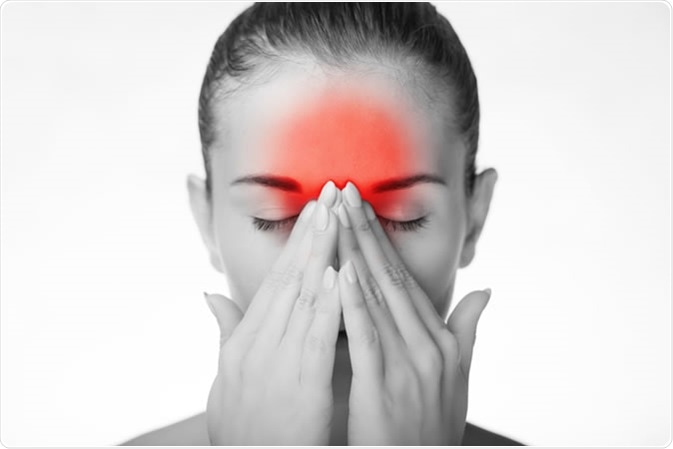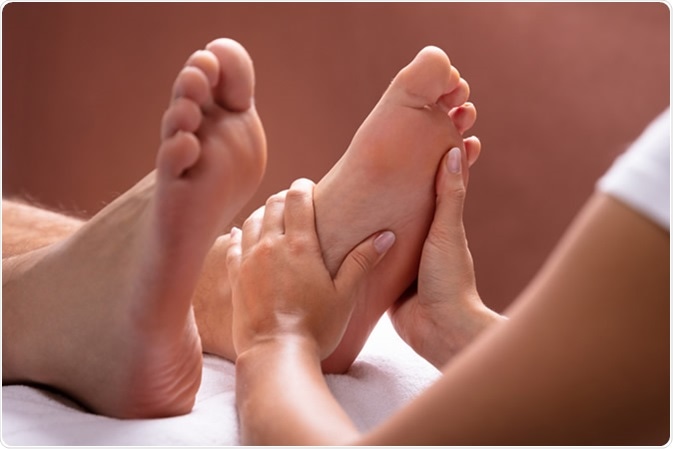Skip to:
What is a migraine?
A migraine is a headache characterized by a throbbing sensation on one side of the head and sometimes other symptoms such as nausea, light-headedness and sensitivity to light and sound.
Migraines can interfere with day-to-day life and symptoms may be so severe that they disrupt concentration, interrupt sleep and cause weakness and fatigue. Some people who suffer from migraines find they need to take time off work or school and even stay in bed.

Image Credit: Leszek Glasner / Shutterstock
Migraine headaches can build up gradually over the course of one or two hours and can last anything from four hours to three days.
A migraine may affect a person as often as once a week or as rarely as once every few years. Attacks usually start during early adulthood and tend to get less troublesome as a person grows older.
The condition is common, affecting around one in every 5 women and one in every 15 men. Women can have menstrual migraines, with attacks occurring monthly, around the time of their period.
The exact cause of migraines is not known, but it is thought to involve temporary changes in nerves, chemicals and blood vessels in the brain. About half of people who suffer from these headaches have a close relative who also has the condition, suggesting a genetic element.
Some people find the onset of a headache is associated with certain triggers, such as stress, menstruation, fatigue and certain foods or drinks.
There is no cure for migraines, but there are approaches to help relieve symptoms, reduce pain and decrease their frequency.
Reflexology
Reflexology is an alternative therapy where the thumb and fingers are used to apply pressure to reflex points on the feet, hands or ears that are thought to correspond with organs and glands in the body.
Reflexologists believe this sends a “calming” message from peripheral nerves to the central nervous system, which instructs the body to reduce tension. The practice is thought to aid circulation and improve the symptoms of many health conditions.

Image Credit: Andrey_Popov / Shutterstock
Research has been conducted in the United States and worldwide to examine the potential benefits of reflexology for reducing pain, anxiety and depression. However, the research has generally been of low quality and has generated inconsistent findings.
One large analysis by Kunz and Kunz (2008) of 168 studies that included data available on the frequency and duration of reflexology practices concluded that reflexology may potentially benefit individuals in the following ways.
Impact on certain organs
Functional magnetic resonance imaging (fMRI) showed that reflexology increased blood flow to the kidneys and intestines. Kidney patients receiving dialysis particularly benefited.
Relaxation
Electroencephalogram (EEG) readings suggested that reflexology decreases blood pressure and relives anxiety.
Pain reduction
Twenty-seven journal articles showed that reflexology reduced pain in cases of diabetes, chest pain, AIDS, kidney stones and osteoarthritis.
A systematic review carried out by Ernst, Posadzki and Lee (2011) critically evaluated 23 randomized controlled trials to assess how effective reflexology is at treating human conditions. Eight studies suggested a beneficial effect, 14 demonstrated no effectiveness and one was equivocal. The authors noted that the quality of the research was often poor and they encouraged researchers to base the design and reporting of future studies on the CONSORT standards.
Can reflexology help migraines?
A 2009 systematic review of randomised controlled trials found that the best available evidence at the time did not convincingly demonstrate that reflexology is an effective intervention in the treatment of any medical condition.
Ernst searched six databases for randomized controlled trials looking into the effectiveness of reflexology delivered by trained specialists for specific medical conditions, including headache.
Of 18 trials that met the inclusion criteria, five yielded positive results, but when the quality of the methodologies were evaluated, they were found to be poor and sample sizes were small. The majority of higher-quality studies did not yield any positive findings to support the effectiveness of reflexology on any medical condition.
A 2018 study reported the results of a placebo-controlled clinical trial assessing the effect of reflexology massage on nitroglycerin-induced migraine-type headache. This type of headache is the main side effect of nitrate therapy, which is used to treat angina.
The trial assessed the effects of reflexology massage on 75 coronary care unit patients who were divided into an intervention group, a placebo group and a control group. The intervention group received two 20-minute massages (separated by a 3-hour interval) of the upper part of both foot thumbs, which in reflexology, is the reflection point of the head. Among the placebo group, an unspecified part of the heel unrelated to the head was massaged and the control group received neither massage.
The study revealed a significant between-group difference in mean pain scale that suggested a reduction in the intensity of headache when reflexology massage was applied.
Further Reading
Last Updated: Feb 6, 2020